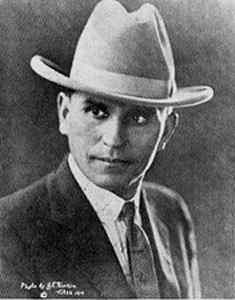|
Moderated by NW Okie! |
Volume 17 , Issue 102015Weekly eZine: (371 subscribers)Subscribe | Unsubscribe Using Desktop... |
Henry Starr, The Cherokee Badman

It was during Henry Starr's 32 years in crime he robbed more banks than both the James-Younger gang and the Doolin-Dalton gang put together. Starr started robbing banks on horseback in 1893 and ended up robbing his last bank in a car in 1921. The Cherokee Badman netted over $60,000 from more than 21 bank robberies.
From the legacy and legends of Henry Starr, discover Henry Starr was born near Fort Gibson in Indian Territory, 2 December 1873 to George "Hopp" Starr, a half-breed Cherokee, and Mary Scot Starr. Starr's mother was a woman of Irish decent and quarter Cherokee. Mary came from an educated and respectable family, but the Starr side of the family was rife with outlaws.
Henry's grandfather was Tom Starr, an outlaw in his own right. Henry would later say that his grandfather was known far and wide as the "Devil's own." Where law and order was on one side, Tom Starr was on the other side.
Henry's uncle was the notorious Sam Starr who married to Belle start, the "Outlaw Queen." Belle was widely known for her relationship with the notorious Younger gang and her criminal escapades through Oklahoma. Henry Starr was not fond of Belle, though, finding her to be crude and reprehensible.
It was in 1886, Henry's father died leaving Mary to care for three children and the family farm. Within just a few months Mary remarried a man by the name of C. N. Walker, who Henry hated. Henry Starr felt that Walker was inferior because his veins contained no Indian blood. We learn that Walker was an abusive person and he and Henry had immediate problems. Henry Starr left home a few short months of his mother's remarriage.
At the age of sixteen, while Henry Starr was working on a ranch near Nowata, in Indian Territory, he had his first run-in with he law. Henry was driving a wagon to town when two deputy marshals caught him with whiskey and arrested him for introducing spirits into the territory. Henry pleaded guilty to the offense, but he maintained that he was innocent, having borrowed the wagon without knowing that the whiskey was in it.
In December 1891, Starr returned to Nowata and continued to work as a cowboy, but it was not long before he had another run-in with the law. Starr was arrested for stealing a horse, denying the charge, but was locked up at Fort Smith, Arkansas. Starr's cousin paid his bail and Henry Starr hit the road, with a warrant for his arrest hanging over his head. After jumping bail, Henry had mad a conscious choice to live not he wrong side of the law. The warrant for Starr's arrest was given to Deputy Marshals Henry C. Dickey and Floyd Wilson who got quickly on Starr's taill.
Starr joined up with Ed Newcome and Jesse Jackson, the gang began to rob stores and railroad depots. The first railroad depot was where he lived, with Starr and his gang relieving the Nowata Depot of $1,700 in July 1892. It was November 1892 when they hit Shufeldts Store in Lenapah, Indian Territory taking $300 and in the same month robbed carter's Store in Sequoyah, Indian Territory making off with $180.
In November 24, 1908, Henry plead guilty to the Amity, Colorado robbery and was sentenced to 7-25 years in the Canon City, Colorado Prison. During his imprisonment, Starr worked as a trustee, studied law in the prison library and wrote his autobiography entitled "Thrilling Events, Life of Henry Starr."
On September 24, 1913, Starr was paroled by the governor and was free again, with the stipulation that he never leave the state of Colorado. But ... Starr did not keep his promise, instead returning to Oklahoma, and his old ways.
It was between September 8, 1914, and January 13, 1915, fourteen different bank robberies were attributed to Henry Starr. All were daylight robberies, carried off quickly and efficiently, at two-week intervals. This was the worst streak of robberies the people of Oklahoma had ever witnessed. In response to the cries of the citizens, the state legislature passed the "Bank Robber Bill,' which appropriated $15,000 for the capture of bank robbers and placed a $1,000 bounty on Starr's head. The reward was payable "Dead or Alive."
The bank robbed between 1914 and 1915 were:
- 09/08/1914 - Keystone State Bank, Keystone, Oklahoma of $3000
- 09/30/1914 - Keifer Central Bank, Kiefer, Oklahoma of $6400
- 10/06/1914 - Farmers' National Bank, Tupelo, Oklahoma of $800
- 10/14/1914 - Pontotoc Bank, Pontotoc, Oklahomaof $1100
- 10/20/1914 - Byars State Bank, Byars, Oklahoma of $700
- 11/13/1914 - Farmers State Bank, Glencoe, Oklahoma of $2400
- 11/20/1914 - Citizens State Bank, Wardville, Oklahoma of $800
- 12/16/1914 - Prue State Bank, Prue, Oklahoma of $1400
- 12/29/1914 - Carney State Bank, Carney, Oklahoma of $2853
- 01/04/1915 - Oklahoma State Bank, Preston, Oklahoma (no money taken, but $1200 damage done to vault)
- 01/05/1915 - First National Bank, Owasso, Oklahoma of $1500
- 01/12/1915 - First National Bank, Terlton, Oklahoma of $1800
- 01/12/1915 - Garber State Bank, Garber, Oklahoma of $2500
- 01/13/1915 - Vera State Bank, Vera, Oklahoma of $1300
| View or Add Comments (0 Comments) | Receive updates ( subscribers) | Unsubscribe
| © . Linda Mcgill Wagner - began © 1999 Contact Me | |
